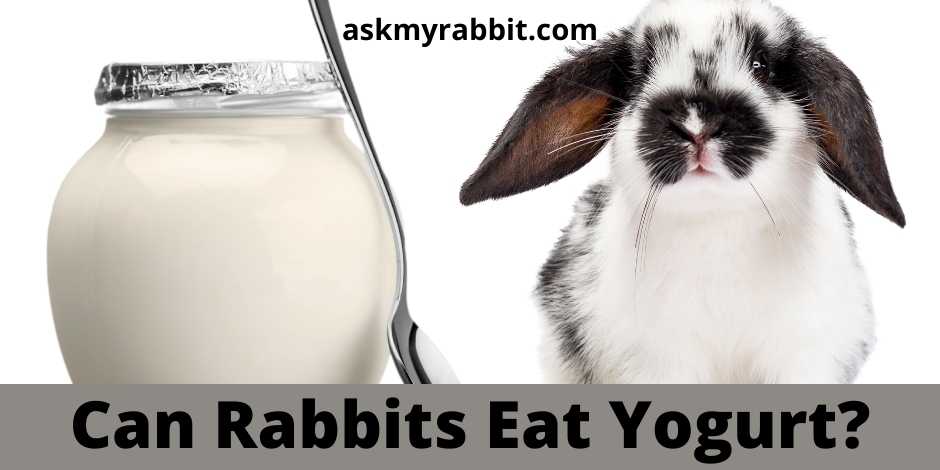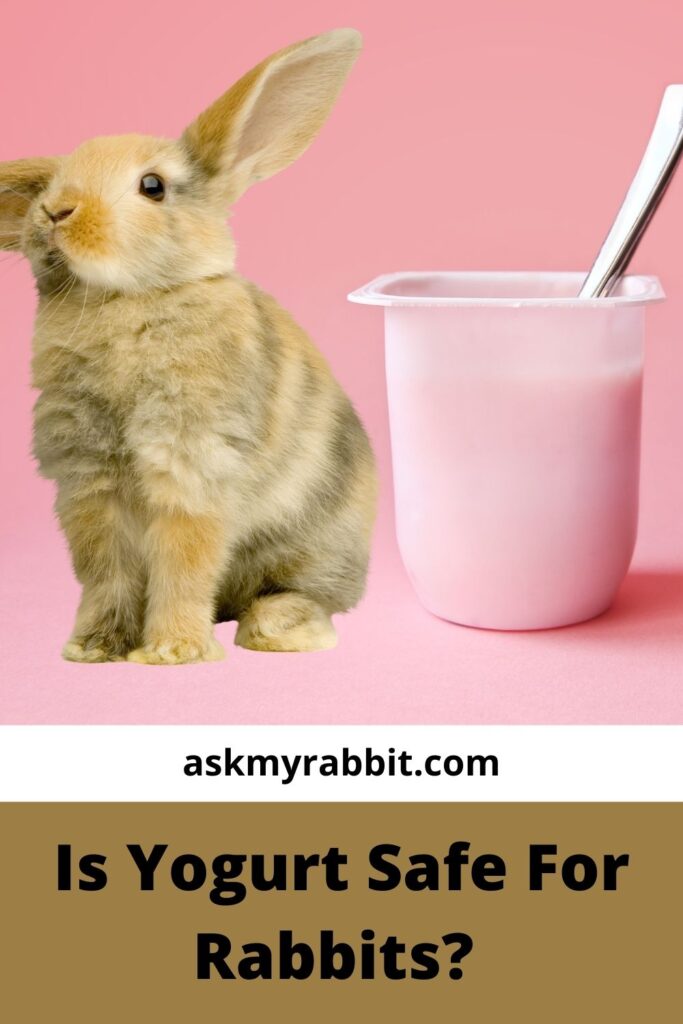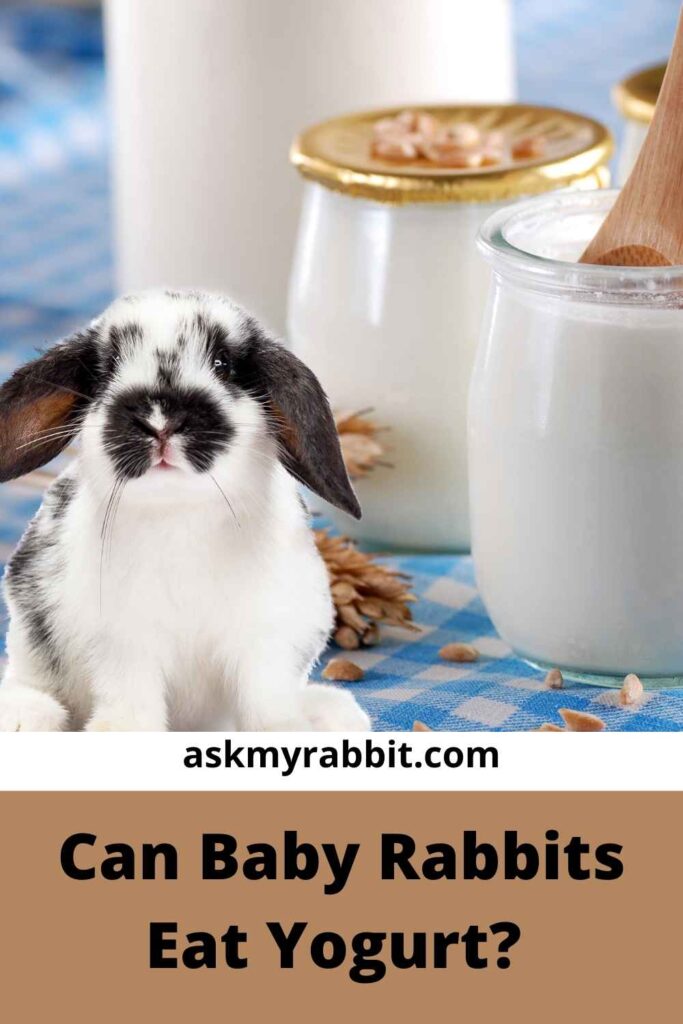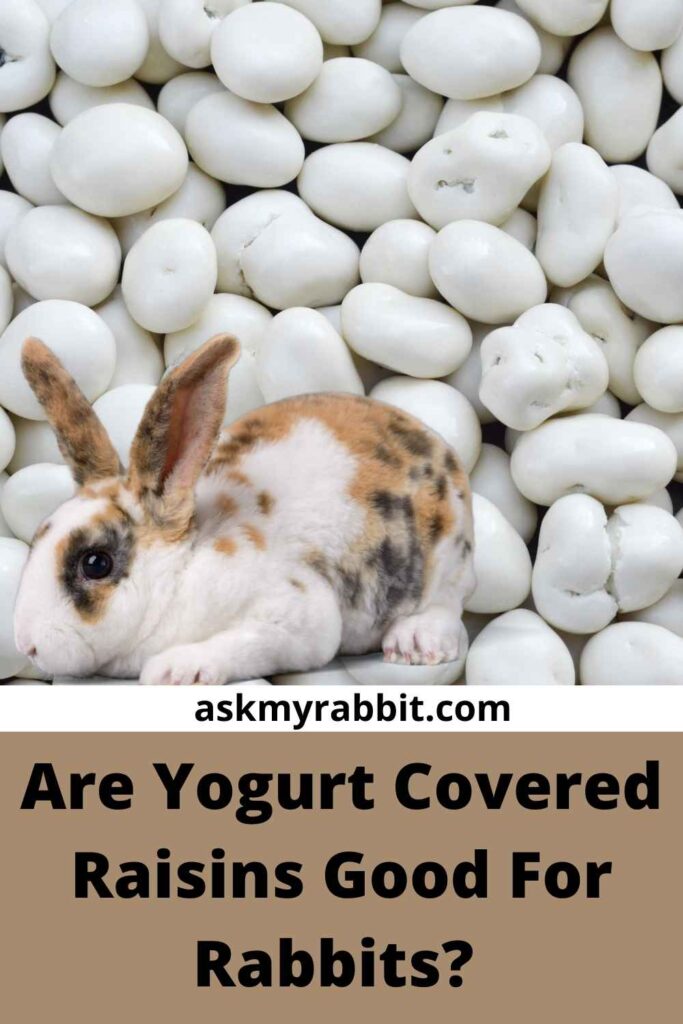Yogurt is a dairy product that is famous all over the world. You may enjoy it as a dessert as well as a snack. So, you may be thinking, can my rabbit eat yogurt?
No, a rabbit should not eat yogurt. Your rabbit’s stomach will never approve of this meal. Yogurt is made up of fermented milk which cannot be digested by your bunny.
Rabbits aren’t lactose intolerant. However, some rabbits, like humans, lose their ability to digest milk enzymes as they age. This is because their gut bacteria is gradually destroyed.
Even if you find yoghurt drops at the pet store, those are worse and may cause health issues in your rabbit.There’s a strong chance he’ll like the taste, but it’s just out of pure curiosity. He can quickly become ill as a result of it.
In this article, we will discuss the various effects of yogurt on your little bunny. So, keep reading!

Is Yogurt Safe For Rabbits?

No, yogurt is not safe for rabbits. While yogurt is nutritious and delightful for humans, you should not offer it to your tiny pet. If the bacteria used in yogurt makes it beyond the stomach, it might cause damage to the intestines.
Another negative effect is that it might create rheumatoid-like lesions in your rabbit. Although yogurt is not inherently toxic to rabbits, it should never be fed to them. Rabbits and other tiny pets should never be fed yoghurt or dairy products.
The rabbit’s gastrointestinal system includes the stomach, small and large intestines, and the cecum. Acidity and aerobic conditions exist in the stomach, as well as in the small and large intestines.
Lactobacillus, a bacterium that may be found in dairy products, will pass through them. However, the issue is found inside the cecum, where only anaerobic conditions exist. Lactobacillus is unable to get past this barrier.
The following are the three most crucial things to keep in mind the next time you offer your rabbit dairy products:
- Rabbits are unable to vomit.
- Dairy products can induce indigestion. This may result in bloating or gas.
- Your rabbit may experience gastrointestinal stasis or watery feces.
These problems will make life difficult for your rabbit. Rabbits should never be fed yoghurt or dairy products.
Lactobacilli may be unable to colonise the digestive tract due to their lack of adhesive capacity. Adult rabbits’ cecum and intestines lack the necessary microorganisms to digest milk derivatives.
Milk derivates increase the development of stasis in adult rabbits when such Lactobacteria are absent. Rabbits administered cow’s milk on a regular basis for several months developed rheumatoid-like lesions, according to studies.
When compared to control rabbits, these rabbits had higher numbers of nucleated cells and higher percentages of T lymphocytes in their synovial fluids. This will correspond to the severity of the histological lesions.
Can Rabbits Eat Greek Yogurt?
No, rabbits should not eat greek yogurt. According to research, greek yogurt may have a role in fatal cases of enterotoxemia. This is a toxic proliferation of bacteria in the intestine.
As a result, avoid both the unsweetened and sweetened varieties of greek yogurt. In fact, the sweetened version is worse since the sugars can induce a bacterial imbalance in the cecum flora. This can lead to GI stasis and other problems because the extra sugar is either transferred to the cecum or converted to fat.
Through greek yogurt, you’re just giving your rabbit too much sugar, which he or she doesn’t need. Instead, go for healthy alternatives that won’t harm your bunnies.
Can Baby Rabbits Eat Yogurt?

No, baby rabbits should not eat yogurt. Except for milk, they will be unable to digest yogurt or other dairy products. Even though newborn bunnies may handle lactose, there’s no reason to take a chance and feed your rabbit this type of food.
Use KMR (Kitten Milk Replacer) or goat’s milk instead of cow’s milk for your newborn bunny. You can buy these at pet stores or even a local veterinarian’s office.
Your newborn rabbit only needs the correct sort of milk until he is three weeks old. You can try a combination of milk and alfalfa from that age until he is seven months old.
If you’re giving goat’s milk, make sure it’s warm. You may also add one tablespoon of heavy whipping cream without sugar to each can of KMR.
It’s also a good idea to add a sprinkle of acidophilus (commonly known as a probiotic) to the formula to encourage healthy gut flora. Remember that rabbits can only eat KMR (Kitten Milk Replacer). Rabbits should not be given Esbilac or any other puppy formula.
Taking care of a newborn rabbit is more challenging than it appears. The mother rabbit goes to great lengths to ensure the safety of her young. Therefore, provide only the best for your baby rabbit.
Can Rabbits Eat Yogurt Drops?
No, rabbits should not eat yogurt drops. Even though you may still get yoghurt drops at pet stores, they are not advised.
The first ingredient in yoghurt drops is sugar. It also includes dairy and fat. If your bunny eats yogurt drop too frequently, it can induce enterotoxemia. It may also lead to teeth decay in your bunny.
There’s no incentive to take advantage of yogurt drops for your bunny. You could consider their probiotic content. However, there are better options available. Runny stools or GI stasis will never be cured by a few sweet yoghurt drops.
Yogurt drops will just aggravate the situation. However, if the situation becomes critical and you lose control, we strongly advise you to consult a veterinarian. Runny stools and GI stasis may be highly harmful to your rabbit if not handled properly.
Are Yogurt Chips Good For Rabbits?
No, yogurt chips are not good for rabbits. They won’t die from yoghurt chips, but they are rather harmful. The digestive tracts of bunnies are not designed to handle dairy.
You can instead feed them banana chips as an alternative. Dehydrated banana chips are also a popular snack for rabbits.
Can Bunnies Eat Frozen Yogurt?
Frozen yoghurt is a dairy-based frozen treat prepared with yoghurt and additional ingredients. It’s commonly confused with ice cream. It has a slightly different flavor and is lower in fat than ice cream.
Unfortunately, rabbits cannot eat frozen yoghurt. In fact, they are unable to consume any dairy products. Dairy products make rabbits exceedingly sick since they are unable to digest them.
If they do consume them, seek veterinarian care immediately. As a result, any frozen yoghurt should not be given to bunnies.
Are Yogurt Covered Raisins Good For Rabbits?

If raisins are okay for rabbits, you might be wondering if raisins wrapped in yoghurt are as well. Regrettably, this is not the case.
Yogurt covered raisins are not good for bunnies. If you add yoghurt to raisins, the dessert will become less nutritious, not healthier.
This is due to the fact that rabbits are herbivores. Any animal food, such as yoghurt, might upset their delicate intestinal flora. These fats and proteins are simply too much for a rabbit’s digestive tract to manage.
Rheumatoid-like lesions may occur in rabbits who are given cow’s milk. Dairy products are also a typical cause of GI stasis in bunnies.
You may have seen yoghurt drops marketed as safe for rabbits in pet stores. This is mostly for the purpose of special treatment. In rare circumstances, rabbits with digestive problems may benefit from eating yoghurt since it has its own bacterial culture.
The yoghurt, on the other hand, should be thinned out and given in tiny doses. This should only be done under your supervision and with your veterinarian’s permission.
Can Yogurt Be Used Medicinally?
Yes, yogurt can be used medicinally for bunnies in some cases. While you should not offer yoghurt to your fluffy pet as part of his or her treats, it can be utilised medicinally. When diluted in water, it can be administered to rabbits on antibiotics.
This can help prevent bacterial imbalances in their intestines. Acidophilus can also be used.
Frequently Asked Questions
Can Rabbits Eat Milk Drops?
No, rabbits should not eat milk drops. We do not advocate giving rabbits any dairy products, such as yoghurt or milk drops.
What Are Rabbits Not Allowed To Eat?
Rabbits should not be fed cookies, nuts, seeds or bread.
Can Rabbits Have Peanut Butter?
No, rabbits should not eat peanut butter. Peanut butter has a lot of fat and should be avoided at all costs. Rabbits will get nothing out of the creamy food except maybe a belly ache.
Final Words
For the reasons we’ve discussed, rabbits should not be fed yoghurt or treats containing it. There are several treats instead you may use to train your rabbit, including certain fruits and non-leafy vegetables that are acceptable for these creatures.
Therefore, you should not feed your rabbits anything that contains dairy. One of the more serious issues in rabbit casual care is that people believe that nutritious foods for humans can automatically be given to rabbits and that they would be okay.
Yoghurt drops will not do immediate harm to your rabbit. However, we are concerned about the long-term issue in this case. The rabbits’ nutritional needs are quite precise, and they are simple feeders. There is no need to start with mixing things up and giving them human food.
Drop down your doubts and queries regarding your furry bunny’s eating habits in the comment section below. We will answer them soon!






